Whether you’re new to LSAs or looking to refine your existing campaigns, this guide is your compass in the promising landscape of Local Service Ads for lawyers.
Google Local Service Ads (LSAs) are a type of ad specifically designed for service-based businesses that operate locally. LSAs prominently feature your business’s name, phone number, and review rating. This ad sits at the top of Google search results, above organic results, search ads, and maps listings.
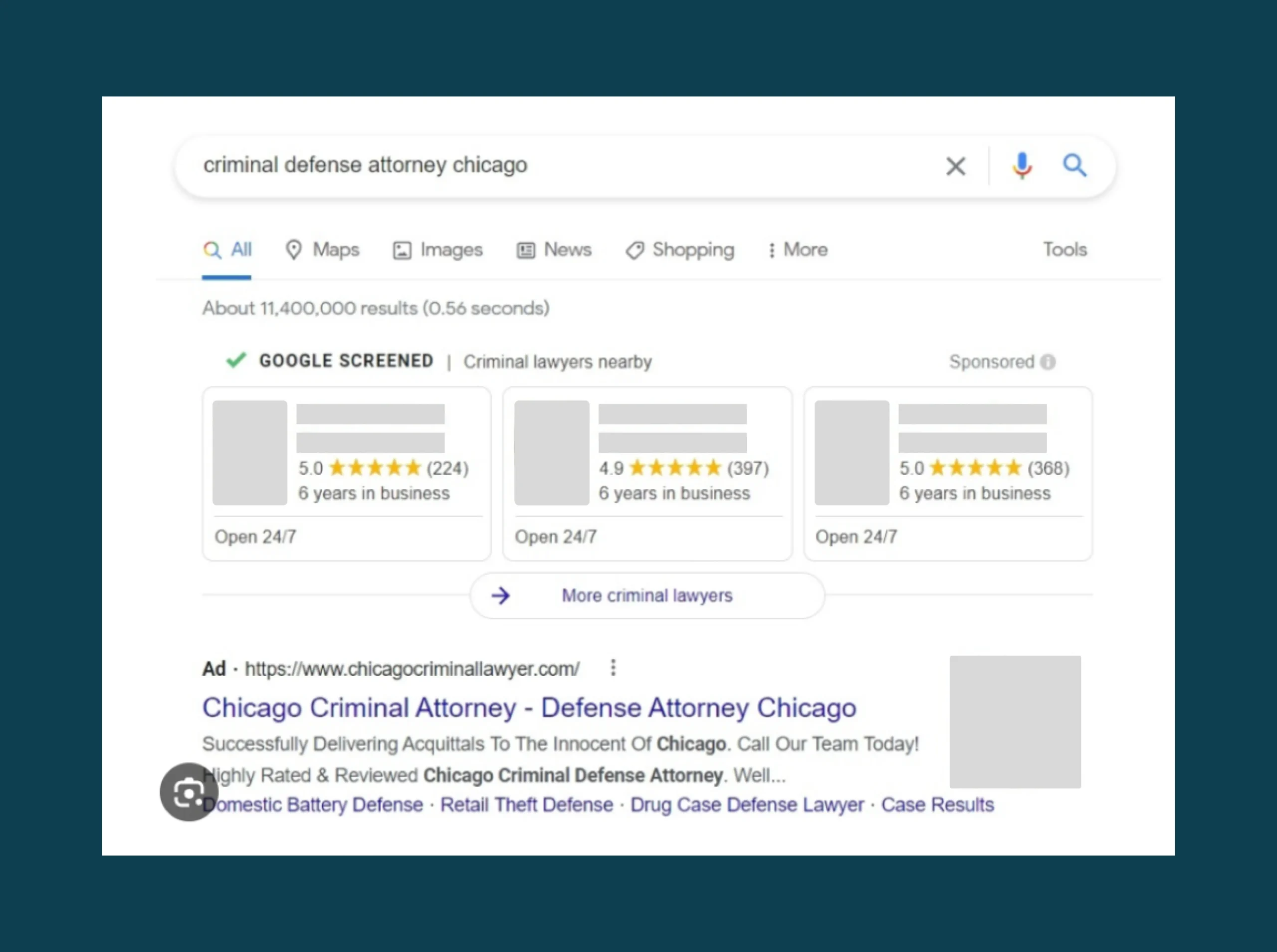
LSAs match users searching for a service with relevant businesses in the same area, making them ideal for attorneys.
Local Service Ads operate on a pay-per-lead basis.
Unlike traditional pay-per-click, with LSAs you only pay when a potential customer contacts you directly through the ad. For example, calling your law firm or sending a message.
And the best part? You only pay for qualified leads related to your legal expertise.
For example, if you are a family law attorney located in Los Angeles and you receive a call regarding a personal injury case via your Local Service Ad, you will not be charged for that lead.
This is because LSAs are specifically designed to connect potential customers with local service providers for the types of services they are seeking. Since the lead (phone call) does not match the services you offer as a family law attorney, you would not be charged for it. (We’ll dive more into this later)
Think of LSAs and SEO as a dynamic duo in your digital marketing strategy.
While SEO plays the long game, gradually boosting your organic online presence, LSAs provide a more immediate visibility boost.
They complement each other beautifully, with LSAs offering a quick way to top the search results while your SEO efforts continue to build a solid foundation. Together, they ensure your firm is seen by the right people at the right time.
With LSAs, you invest solely in leads that match your specified service offerings, making every dollar count. If you happen to receive a lead that doesn’t quite fit your criteria – maybe it’s an accidental inquiry or falls outside your area of expertise – you have the option to dispute it with Google.
By doing so, you ensure that your budget is allocated to genuine prospects, ultimately improving the cost-effectiveness of your campaign.
Securing a spot at the top of Google’s search results is a significant advantage of LSAs. Your firm isn’t just listed; it’s highlighted above traditional search results and even standard PPC ads.
This prime positioning means your services are one of the first things a prospective client sees, dramatically increasing the likelihood of engagement. Enhanced visibility translates into more eyes on your firm and more potential leads.
Being Google Screened isn’t just a badge; it’s a trust signal to prospective clients.
This badge, prominently displayed on your LSA, tells users that Google has verified your firm’s legitimacy and credibility. The screening process includes checks like business registration validation, background checks, and verifying your legal qualifications. This means users are more likely to trust your firm over others. It’s a mark of quality and reliability that sets your services apart in a crowded marketplace.
One of the most appealing aspects of LSAs is the level of control they offer over your advertising budget.
You can set a weekly or monthly cap, ensuring you only spend what you’re comfortable with during that time. Once you’ve hit your budget, Google automatically pauses your ad.
Additionally, pausing your ads allows you to manage lead flow according to your firm’s capacity. You can ramp up your visibility during peak times, or scale back during slower periods. All while maintaining control over your advertising expenditure. This pay-per-lead model ensures a higher return on investment.
Smaller law firms can effectively compete with larger firms using Local Service Ads (LSAs). Unlike other Google advertising services where budget often dictates ranking, LSAs level the playing field by prioritizing relevance and user experience over ad spend.
Smaller firms have an equal opportunity to appear at the top of Google search results alongside larger competitors, regardless of budget size.
Among the most effective tools in your arsenal are Local Service Ads (LSAs), Local Search Ads, and Google Ads. Each serves a distinct purpose, attracts different types of traffic, and offers unique value.
Local Service Ads (LSAs):
Local Search Ads:
Google Ads:
So, which ad should you try? This really depends on your law firm’s goals and budget. Each ad type offers its own benefits, the most effective strategy often involves a combination of all three.
LSAs bring immediate, local leads; Local Search Ads enhance your local visibility; and Google Ads broaden your reach and provide detailed insights.
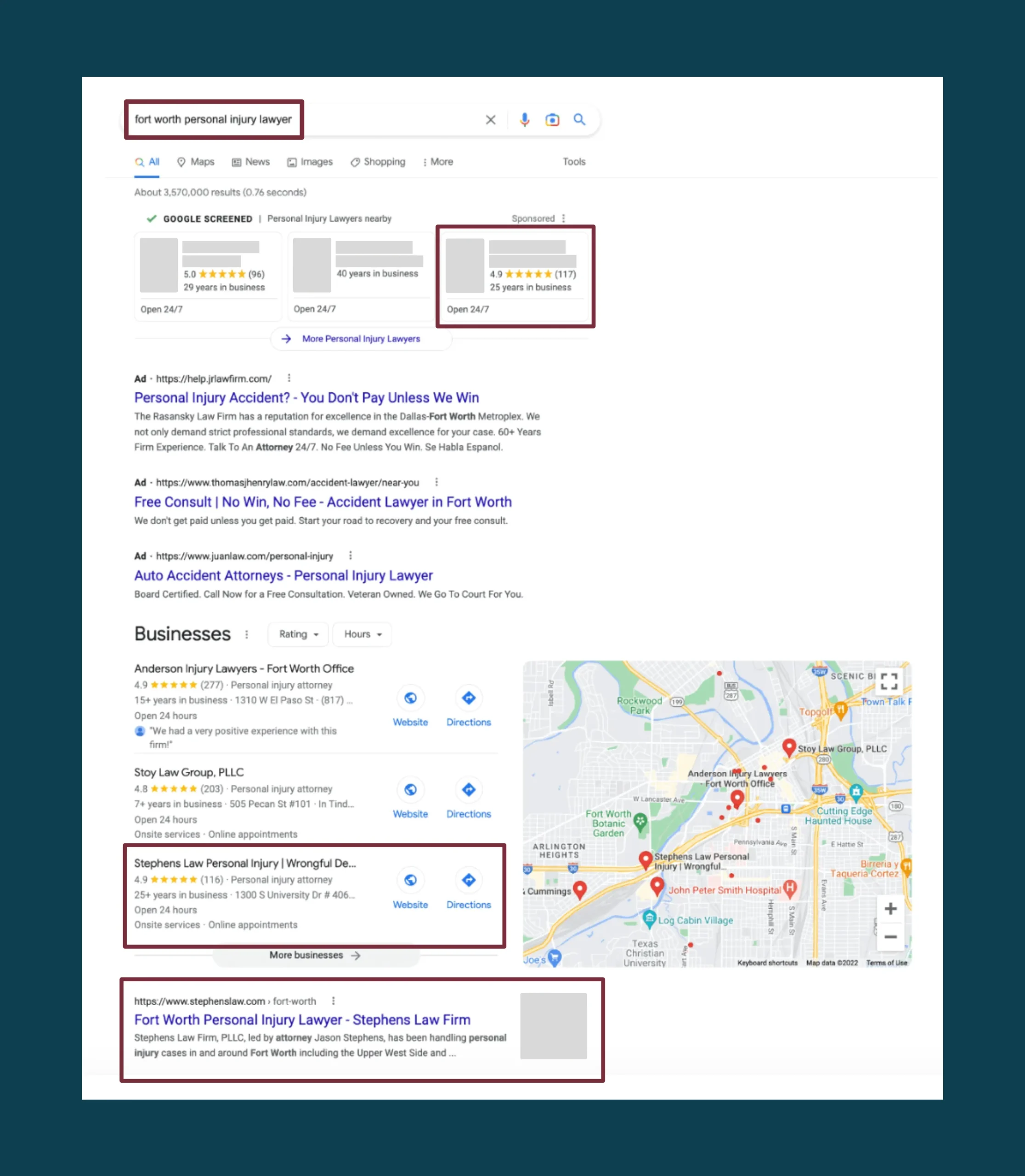
With a comprehensive digital marketing strategy, your law firm can appear multiple times on a single search results page, including in Local Service Ads (LSAs), the Google Maps pack, paid Google ads, and organic search results.
By securing multiple placements within the same search results, you greatly enhance the likelihood of potential clients reaching out to you.
This multi-faceted approach maximizes your visibility and engagement opportunities, ultimately driving more inquiries and conversions for your law firm.
Below we’ve outlined all of the currently available service targeting for law firms in Google Local Services Ads
The practice areas you choose and the locations you target significantly impact the effectiveness and efficiency of your Local Service Ads.
Not all practice areas yield the same return on investment, and not all regions hold the same potential for lead generation. Understanding how to make these selections intelligently can substantially enhance your firm’s success with LSAs.
The key is assessing leads’ potential value in different practice areas. For example, while estate planning leads might cost less, the overall client value could be lower than in practice areas like personal injury or family law, where clients might be dealing with more pressing, high-stakes issues. A lead for a car accident case might cost $200, but the potential return is significantly higher due to the nature of these cases. Therefore, weighing the cost per lead against the average client value in each practice area is crucial.
When choosing practice areas for your LSAs, consider the following:
Your location settings in LSAs go beyond just pinpointing your whereabouts. They’re about understanding your potential clients and identifying where you can truly meet their needs. It’s not always about casting the widest net but casting it where the fish are biting.
For instance, if you’re a personal injury lawyer based in a large state like Texas, you might want to target specific cities or regions known for higher accident rates.
Considerations for location targeting include:
By thoughtfully selecting your practice areas and targeted locations, you can ensure your ads are reaching the right people. This strategic approach helps maximize your budget, enhance your ROI, and ultimately drive more qualified leads to your law firm.
Creating an LSA is a step-by-step journey, and we’ll walk you through each one. From signing up to setting your bid, we’ve covered you with detailed instructions and helpful images straight from the setup process.
Visit the official Local Services Ads sign-up page to get started.
Enter your firm’s details to check your eligibility for LSAs.
Set your country, state, and ZIP code, then indicate “Law” in the job category drop-down menu.
Next, select the practice area/s you would like to generate leads for via LSAs.
For instance, if your firm provides family law and criminal law services, you can select both. If you only wish to receive leads for personal injury cases, just check the box next to “Personal injury law”. Then click the “Check Eligibility” button.
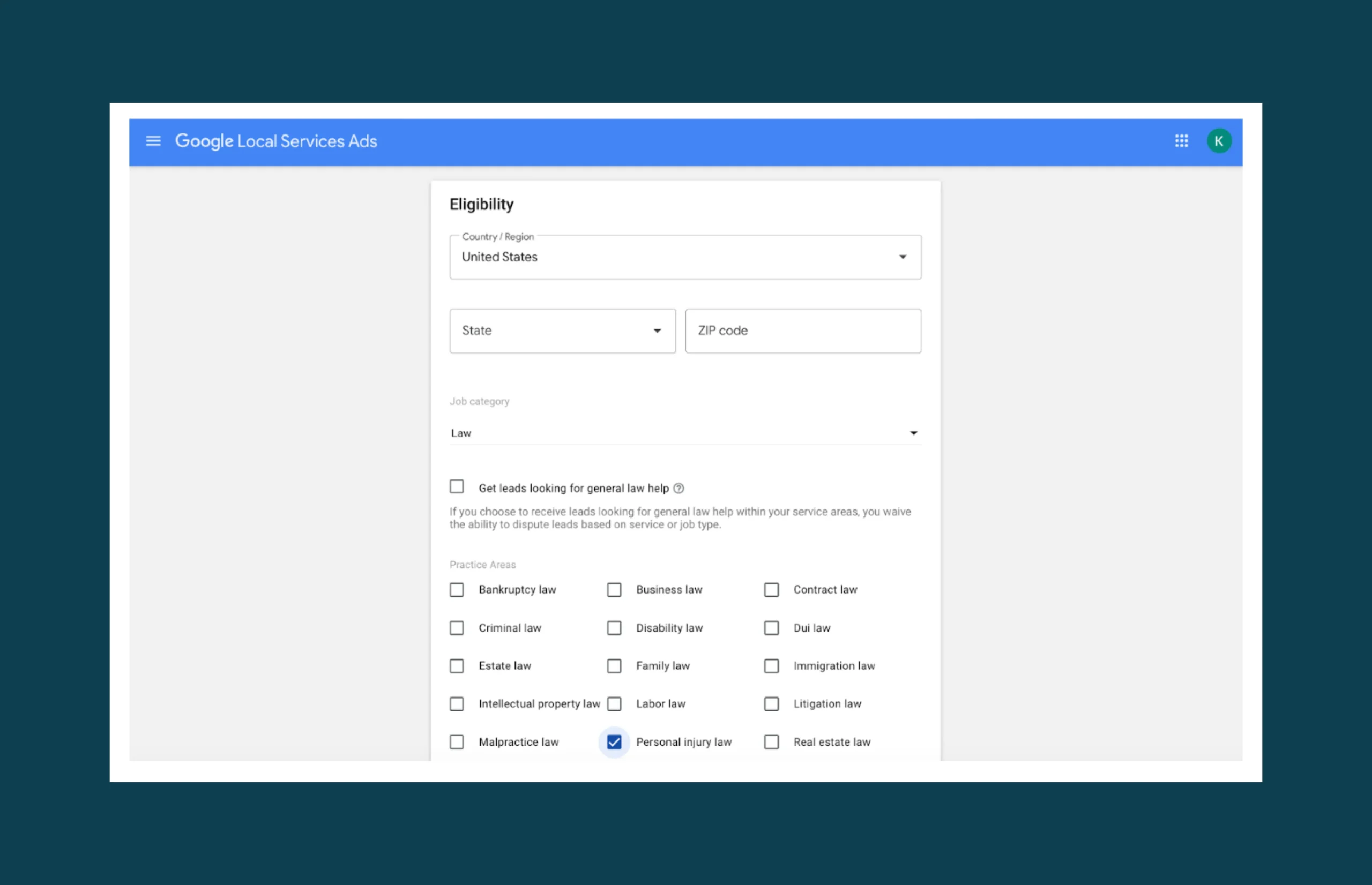
You’ll be given the option to “Get leads looking for general law help”, but it’s important to keep in mind that you’ll be charged for every lead generated. You want those leads to be highly qualified. While a “general law help” approach may suit certain law firms, you’ll likely benefit more from selecting your specific practice area for targeted visibility.
After Local Services Ads (LSA) confirms your eligibility, you can proceed with setting up your ad campaign. Click “Get Started” to proceed.
Fill in the required data for your business details exactly how you’d like them to appear on your Local Service Ad. This will include:
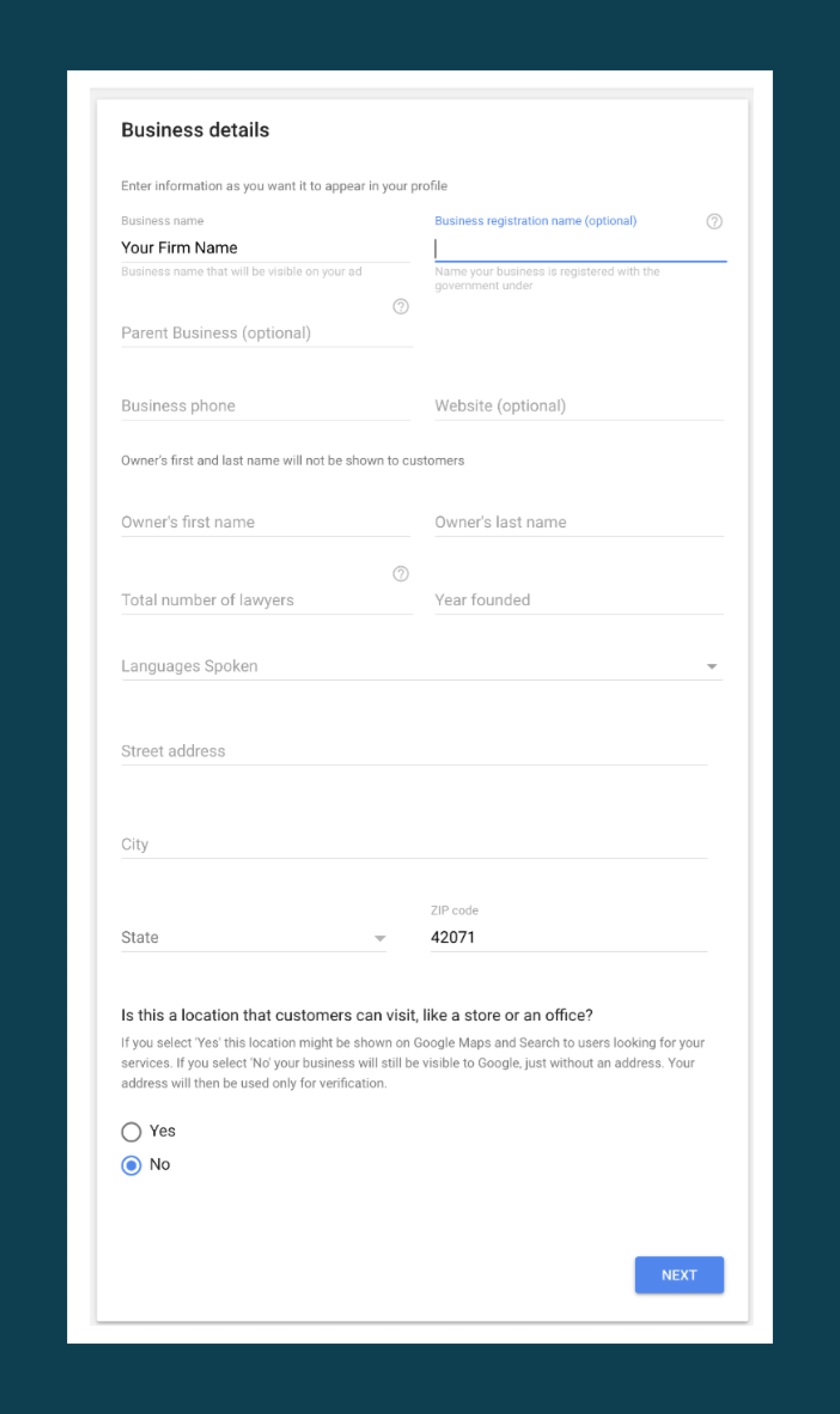
Specify the geographical area where you wish to serve clients. In other words, where you want your Local Service Ads to appear.
Google will automatically select the ZIP code you provided on the business information page, but you can change this, removing or including additional zip codes. You can select as many zip codes as you’d like.
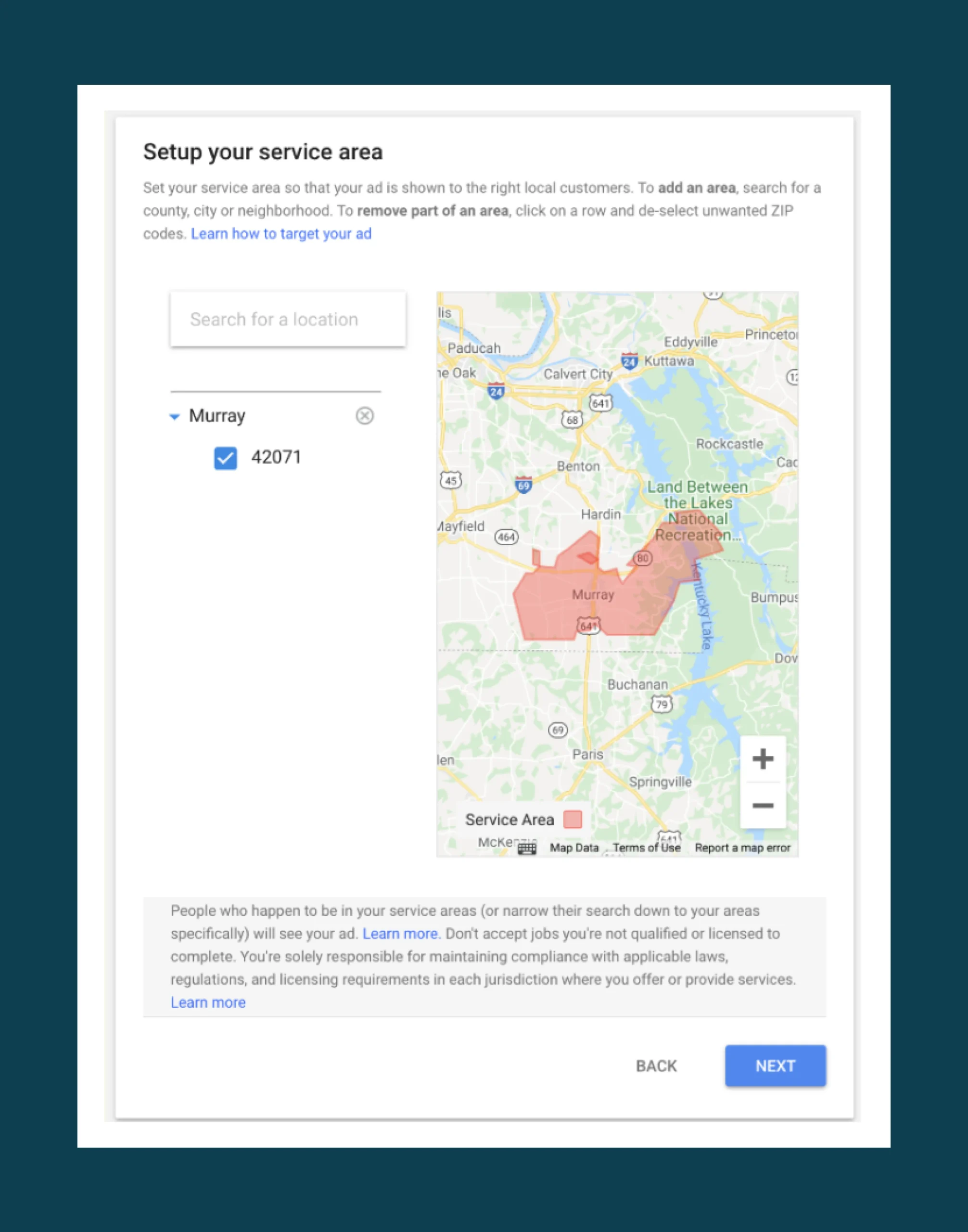
Carefully review the list of case types provided, and select those that align with your law firm’s focus areas.
When selecting your service types, remember that you’ll be charged for every lead generated by the ad. Exclude case types that you prefer not to handle.
For instance, if you’re a personal injury lawyer who doesn’t handle medical malpractice claims, you can omit this from your selection to ensure that your ad targets only the most relevant leads.
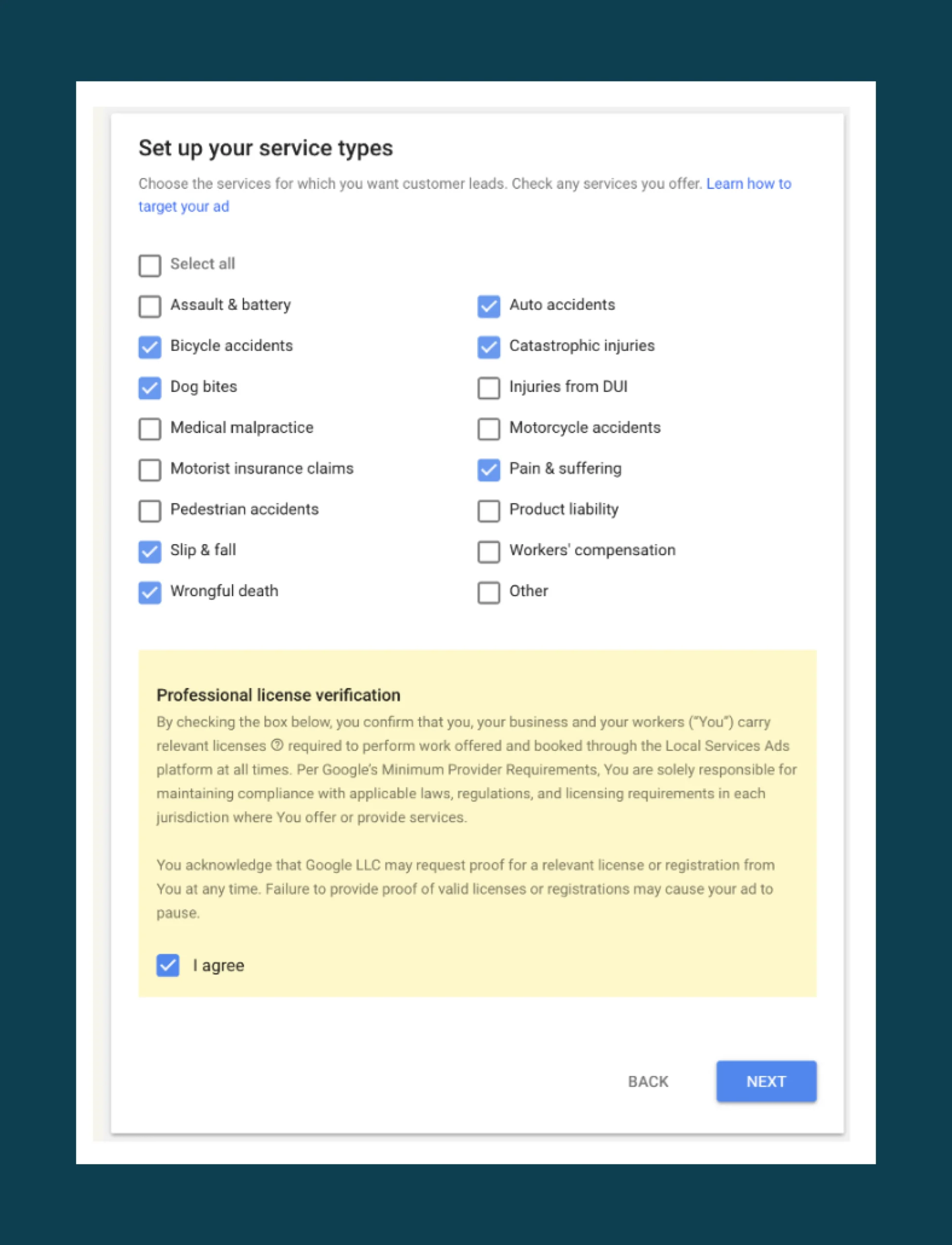
There is a “Professional license verification” at the bottom of the page. Check the box next to “I agree”. This verification process ensures that you are licensed to practice your selected area of law in the designated location/s.
Select the days and times your law firm is open. Ensure that there is a designated staff member available to respond during the selected hours.
For example, if you lack an answering service or onsite staff to handle incoming calls during weekends, avoid choosing the 24/7 availability option. Incoming calls will incur charges regardless of whether they are answered or not.
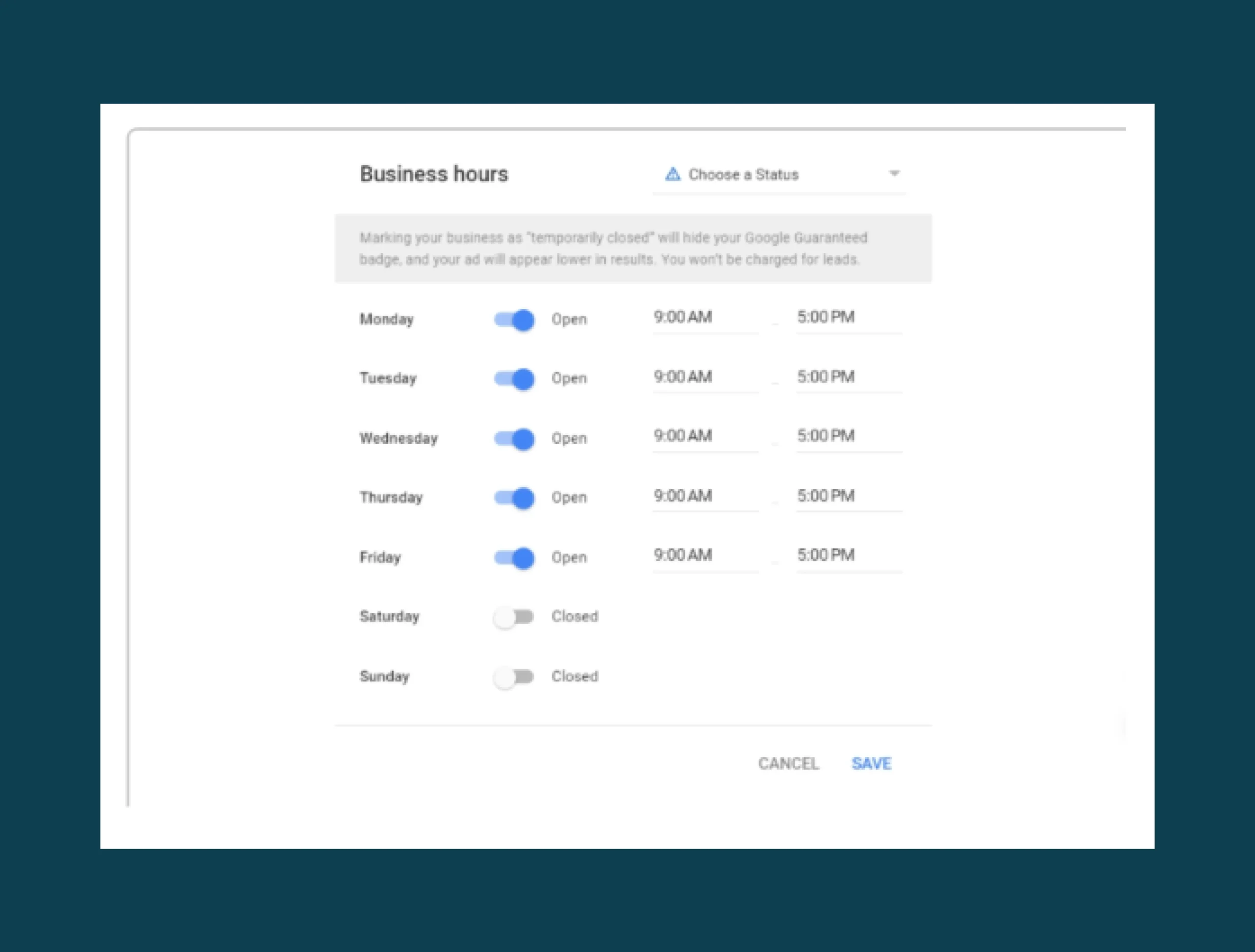
Review how your ad will appear to prospective clients.
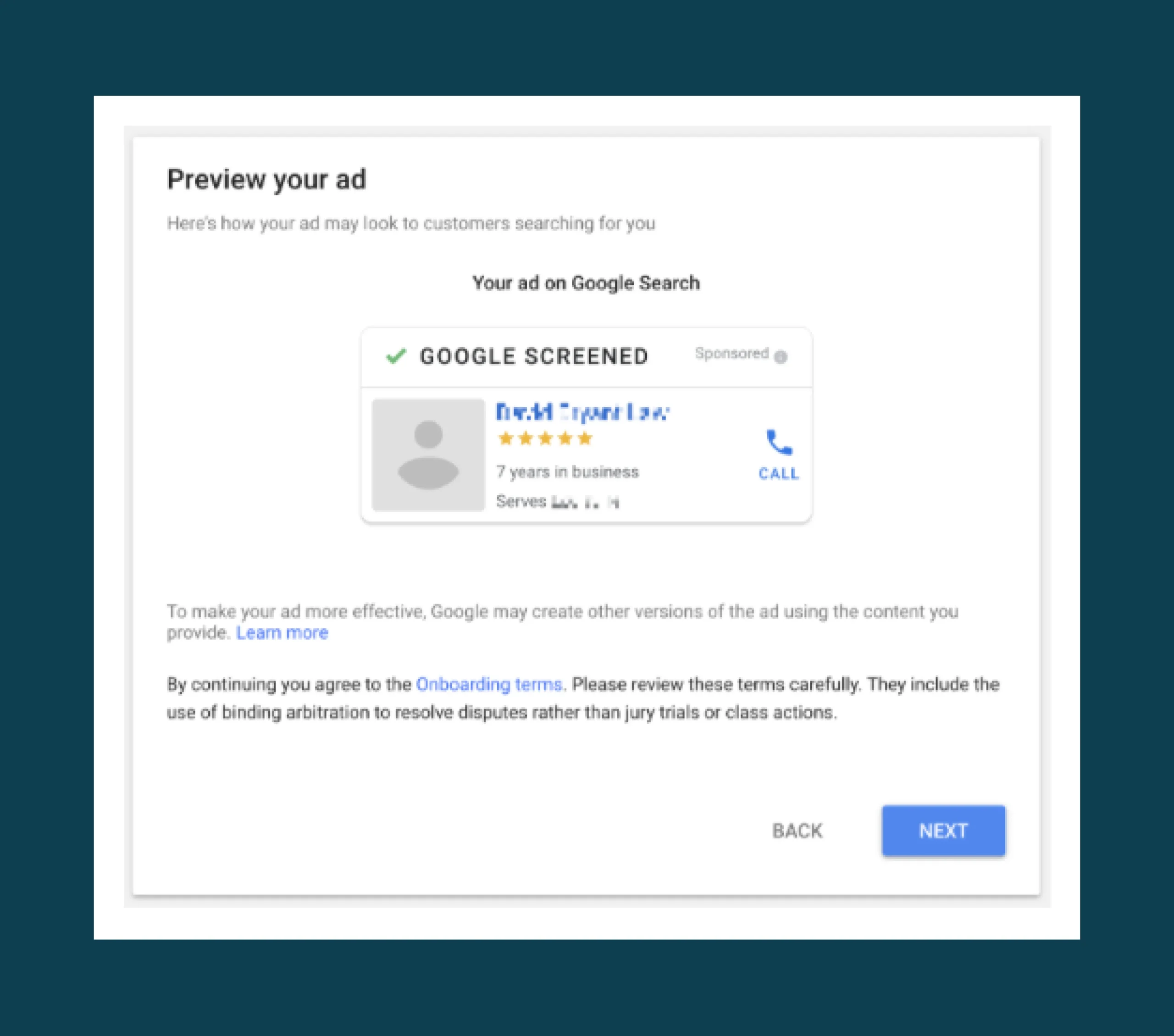
Next, you will provide Google with more information about your firm. Steps 8 – 13 are shown in the image below.
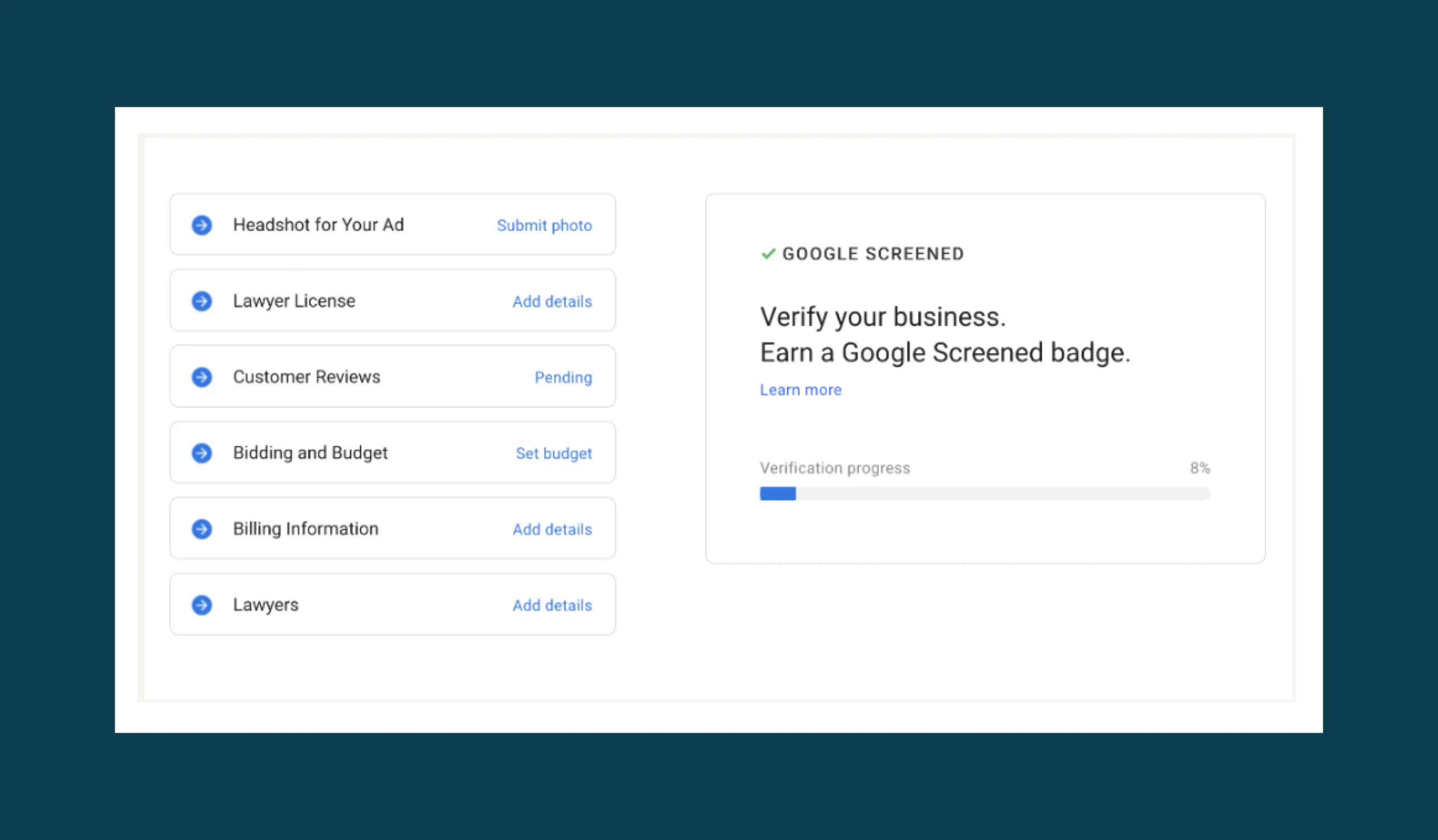
Personalize your ad with a professional photo.
The image must feature only one individual, displaying their head and shoulders without any accompanying text. If your law firm comprises multiple lawyers, you can include them at a later time.
Once you’ve uploaded your photo, it will be reviewed to ensure it meets Google photo guidelines.
Add your business license details:
Click “Save” when finished to start the verification process. Note that the verification and background check process can take up to 2 days.
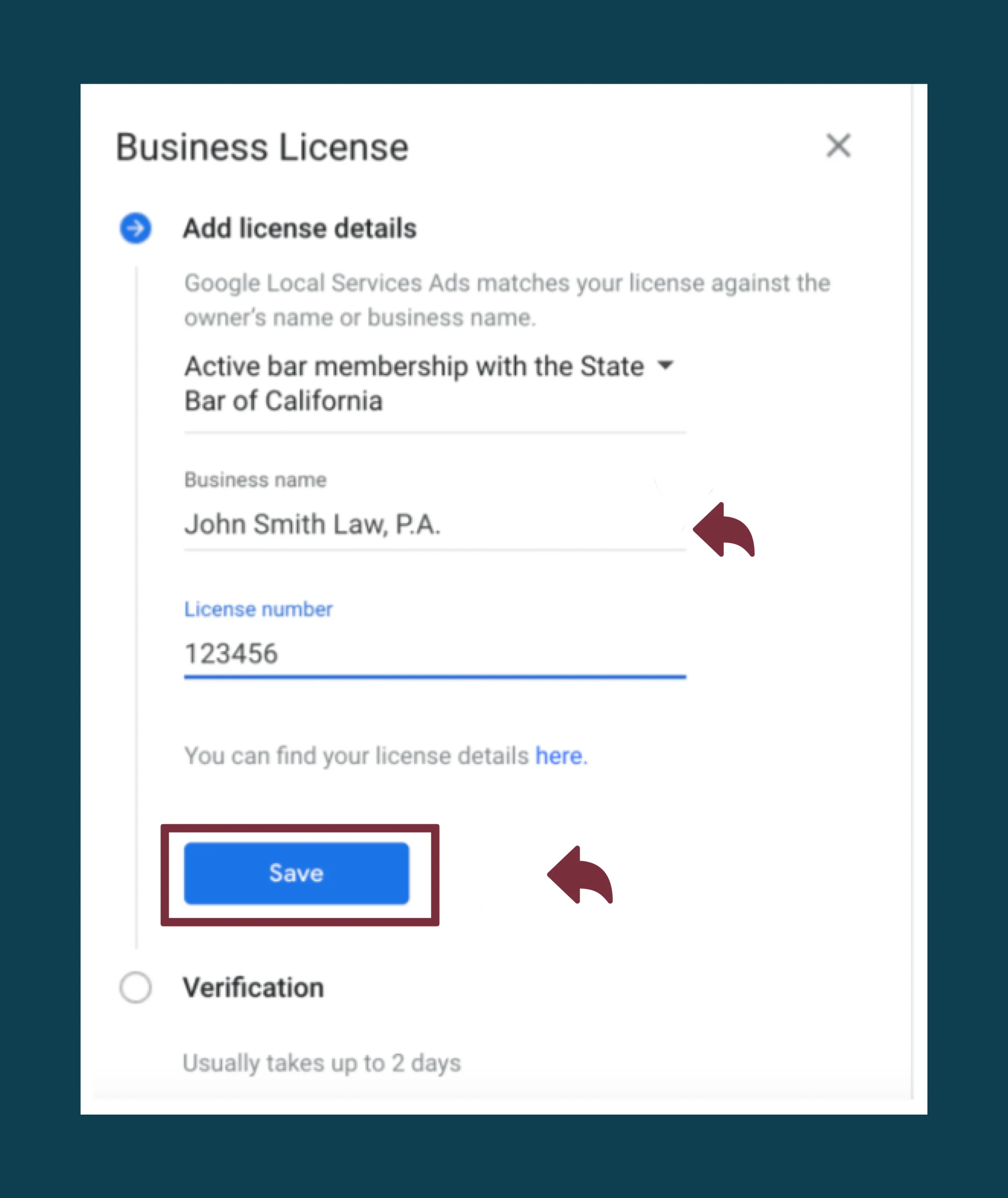
If you already have a Google My Business listing, Local Service Ads will automatically pull your GMB reviews.
You must have at least one review to run LSAs.
If you do not have any reviews on your GMB profile, you can share a link with past/current clients to request a review. Click “See link options”, select a link, and send it out. When an individual uses the link you provide, the review is posted as verified and added to your LSA.
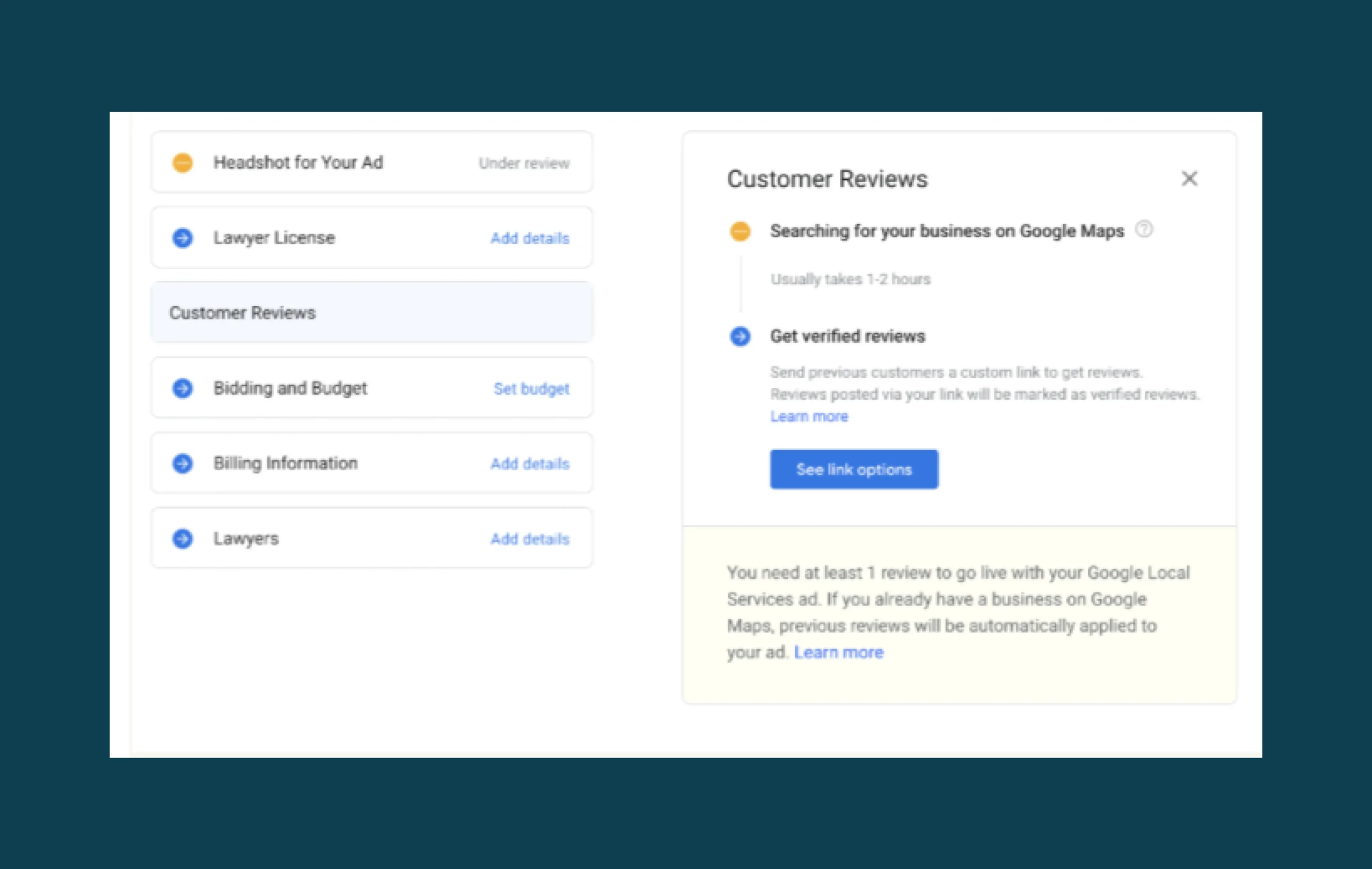
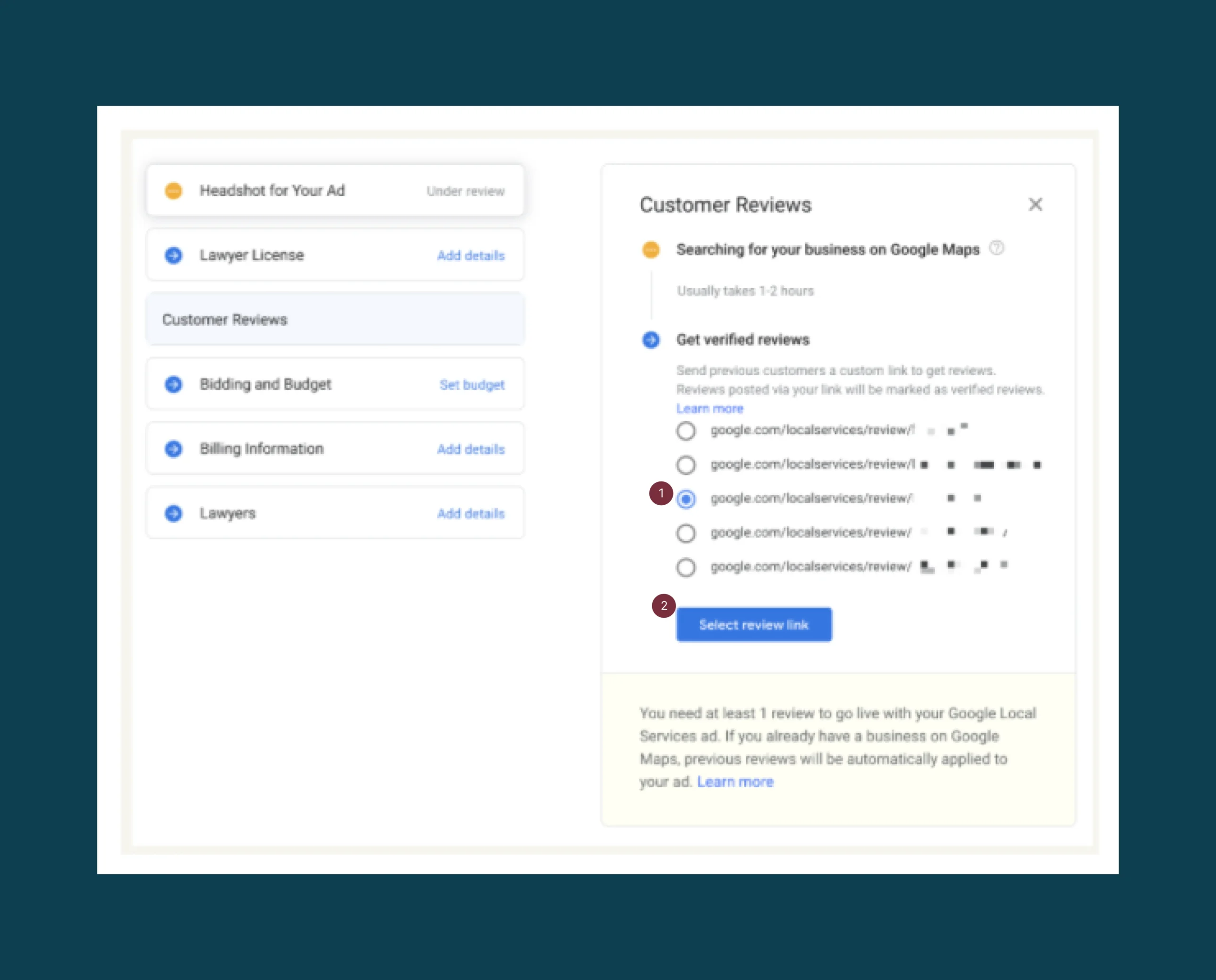
Choose Your Bidding Mode
In Local Service Ads, your “bid” is how much you are willing to spend per lead. Google provides two bidding modes to choose from:
Google recommends Maximize Leads, though there are no assurances they do what is best for you. If you are new to LSA’s, or working with a tighter budget, we suggest opting for Set Max Per Lead. This mode allows greater control over advertising costs, predictable budgeting, and gives you time to get familiar with the platform.
To make sure you don’t overpay for leads, set the custom amount to the minimum.
You can determine the minimum amount by clicking “Custom amount” and setting it to $0. Google will then provide you with the minimum dollar amount required to start bidding. This number can serve as a rough starting point for your bids, and you can adjust it later based on the ROI you’re experiencing from the LSA.
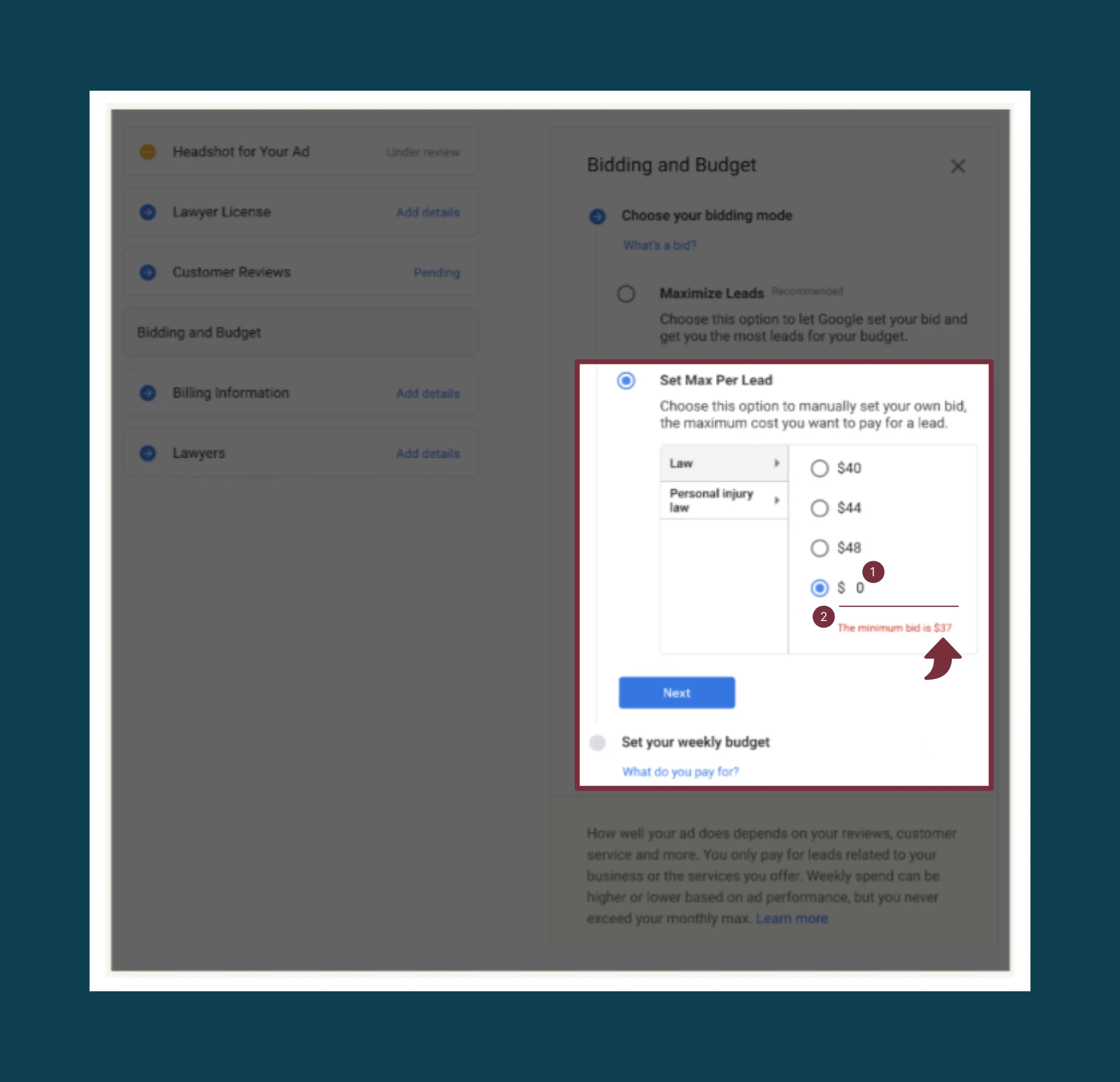
If you provide multiple service types, follow the same steps for each.
Set Weekly Budget
Next, decide the maximum amount you’re willing to spend on leads per week.
Again, we suggest setting the mandatory minimum weekly budget to start. Repeat the steps above, setting your amount to $0, and Google will provide the minimum amount required.
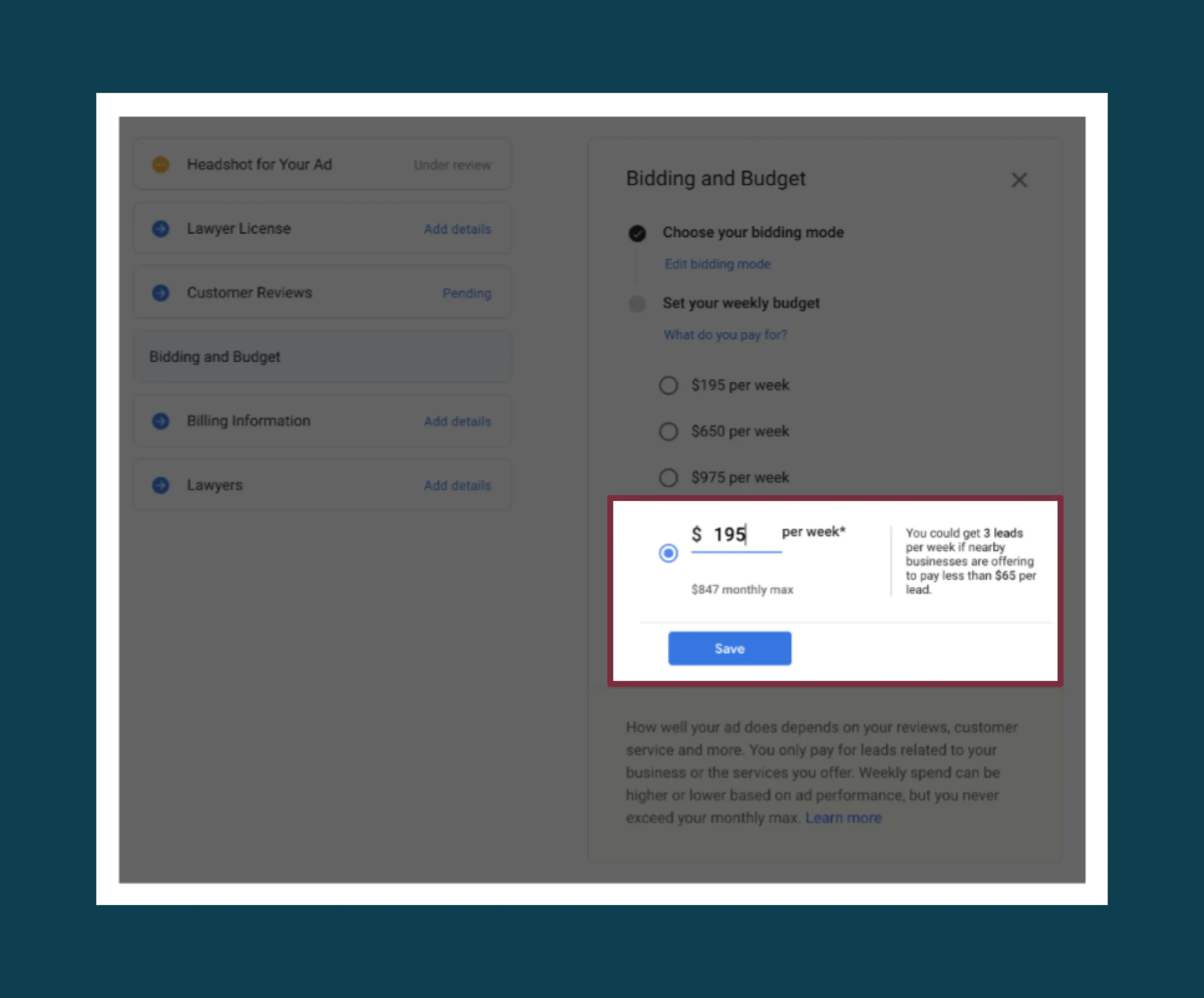
Consider this your test budget. Take some time to gauge lead quality, as this varies by practice area and city.
Once you set your weekly budget, Google provides an estimate of how many qualified leads you’ll receive per week.
Provide payment details to activate your ad. You will be charged automatically on the 1st of every Month.
If your firm has more than one attorney, use the “Lawyers” section to edit the number of lawyers at your business, and provide additional information about them.
When someone interacts with your ad, they’ll see a list of other lawyers working at your law firm (as long as you’ve opted to feature them).
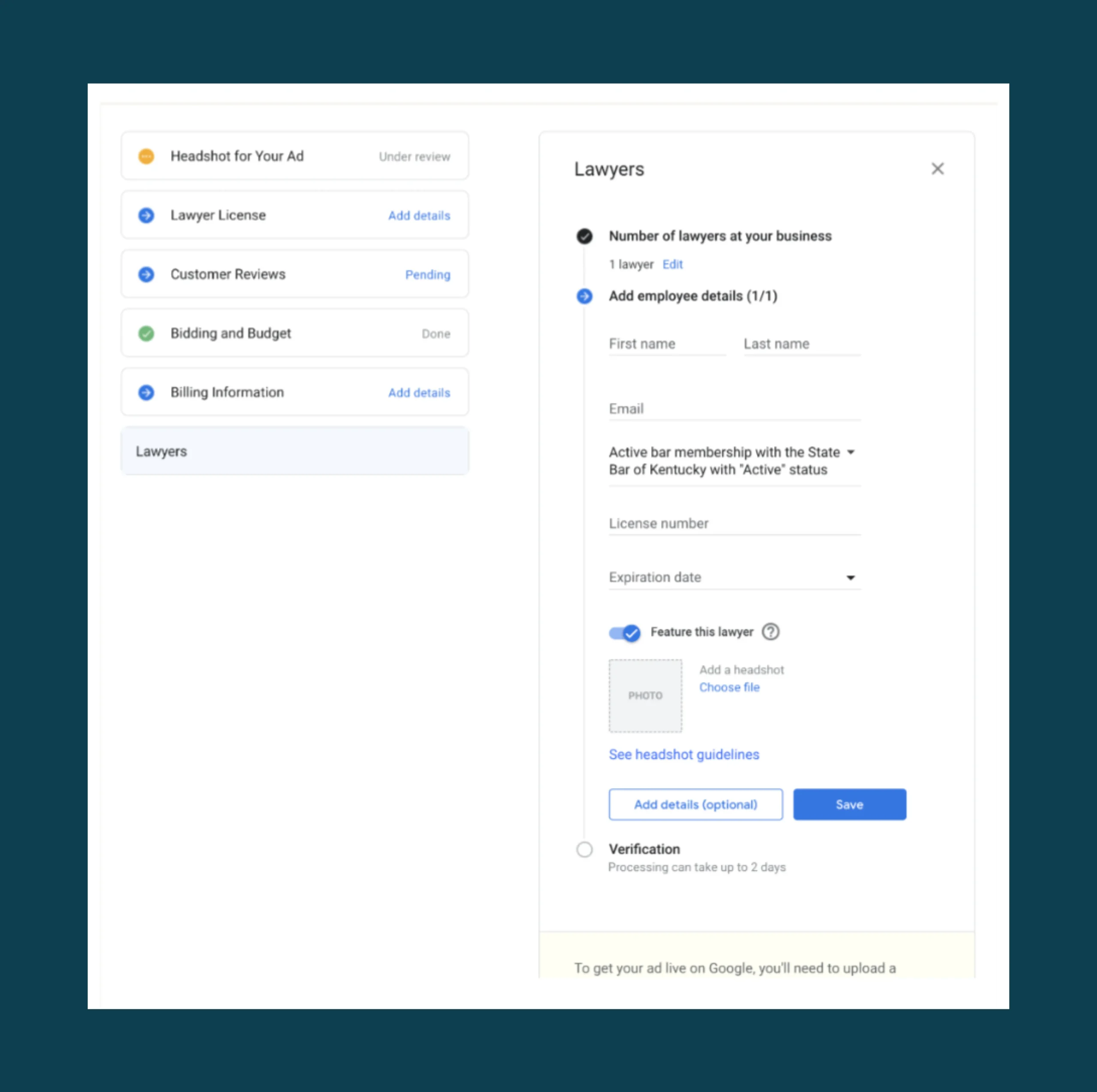
The Google Screened badge is more than just an emblem; it’s a testament to your law firm’s credibility and reliability.
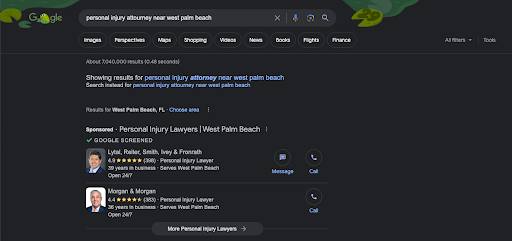
To earn the Google Screened badge, your law firm must undergo and pass a screening process.
Google no longer requires background checks for attorneys, as noted below.
To see a full list of Google’s business screening and verification requirements by law practice type, click here.
For example, here are the requirements for a DUI lawyer:
The Google Trust Guarantee
Once you’ve earned the Google Screened badge, your firm will also be backed by the Google Guarantee. This offers the following advantages:
In the legal field, trust is paramount. The Google Screened badge and the trust guarantee are potent tools that instantly communicate your firm’s trustworthiness and quality to potential clients. They serve as an immediate reassurance, often influencing the decision-making process of individuals seeking legal services.
Effectively managing the leads you receive from Local Service Ads is crucial to maximizing your campaign’s potential and ensuring a high return on investment.
It’s not just about collecting leads; it’s about nurturing them, understanding their value, and leveraging technology to streamline the process.
Here’s how to take control and make the most out of your Local Service Ads leads.
Your LSA dashboard is the nerve center for your campaign. It provides a comprehensive view of your leads, allowing you to track which ones have converted and require follow-up.
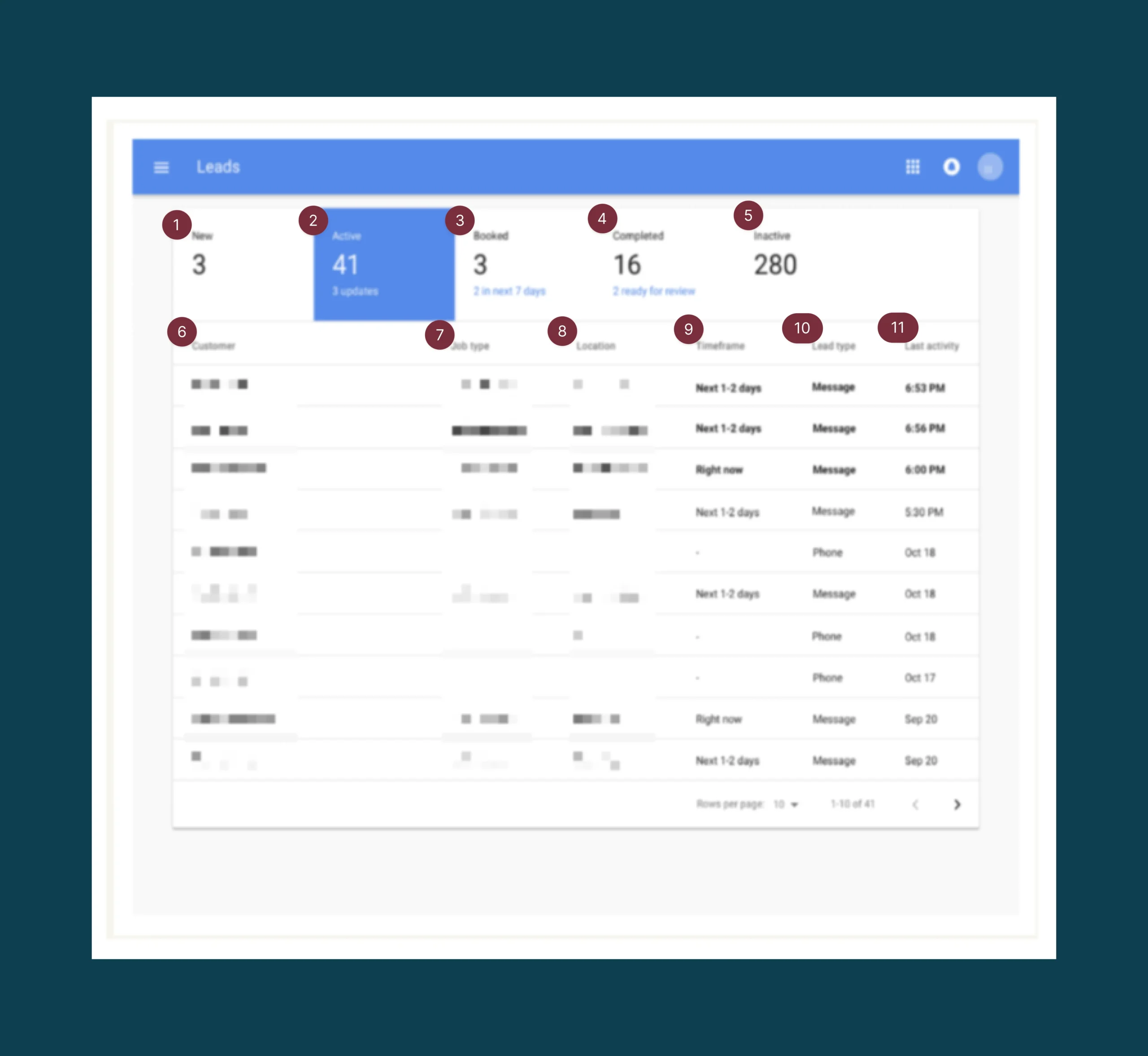
Use this dashboard to view:
There are multiple ways to follow up with leads directly within the LSA platform. You can respond to their messages via email or text, initiate a phone call using the provided contact details, or choose to decline the request if it’s not aligned with your business preferences.
Respond Quickly.
The dashboard will show how promptly you respond to leads. Quick responses improve your chances of conversion and positively affect your LSA ranking.
It’s important to note that declining a lead doesn’t exempt you from potential charges. If the lead is deemed irrelevant, you’ll need to initiate a dispute process accordingly.
To truly understand the ROI of your Local Service Ads, start assigning estimated case values even before they’ve settled. This practice allows you to:
The world of LSAs is dynamic, and so should be your approach to managing leads. Consider the following for continuous improvement:
Local Service Ads is a multifaceted process that extends beyond just collecting contact information. It’s about understanding, nurturing, and converting these leads into valuable clients.
By leveraging your LSA dashboard, assigning case values early, and continuously optimizing your process, you can ensure that your Local Service Ads campaign is not just a lead generation tool but a significant contributor to your firm’s growth and success.
The cost of LSAs varies based on factors like location, practice area, and competition. You’ll pay per lead, not per click, with prices reflecting the market rate for a qualified lead in your specific legal field.
The cost of LSAs varies based on factors like location, practice area, and competition. You’ll pay per lead, not per click, with prices reflecting the market rate for a qualified lead in your specific legal field.
Yes, you can pause your LSAs at any time. This flexibility allows you to control when you receive leads, accommodating your firm’s availability and budget.
“All provider listings in Local Services are displayed and ranked based on an auction, where the highest ranked ads show first. The auction is the process Local Services Ads uses to order profiles for a given search, taking into account bid and overall profile quality. “ – Google
Factors in the auction include:
For a full list of Local Service Ad ranking factors, click here.
Google shows LSAs when users search for services that match the categories you’ve selected for your ad and are within your designated service area.
Unlike traditional PPC ads, you can’t specify keywords for LSAs. Instead, Google matches your ad with relevant searches based on the service types and categories you’ve selected.
Yes, Google allows you to dispute leads if they don’t match the services you offer, are spam, or are outside your service area.
To dispute a lead, log in to your Google LSA dashboard and navigate to the “Leads” section. Locate the specific lead you want to dispute and click on it to view the details. You’ll need to provide a clear and concise reason for disputing the lead. Explain why you believe the lead is invalid or irrelevant based on your business criteria.
Once submitted, Google will review the dispute and determine whether the lead is valid or invalid based on their policies and guidelines. If Google determines that the lead is invalid, they may credit you for the lead or adjust your billing accordingly.

“Hiring Everspark to do the comprehensive SEO audit of my website was money very well spent. They are thorough, knowledgeable and approachable.”
-Mike Rafi
READY TO WORK WITH ONE OF THE BEST LAW FIRM DIGITAL MARKETING AGENCIES?
Pop in your details and we’ll schedule a call.
"*" indicates required fields